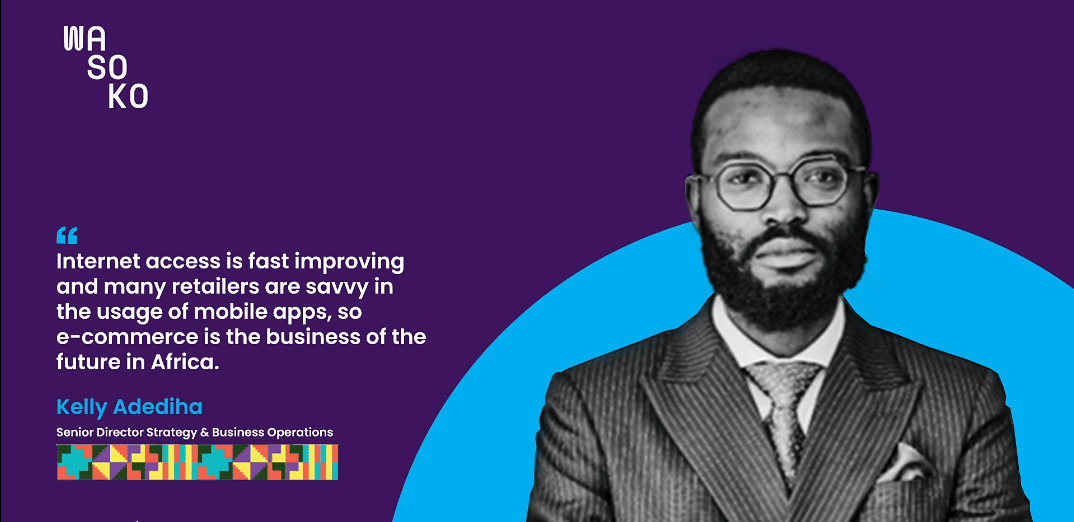My name is Kelly Adediha, Senior Director of Strategy and Business Operations at Wasoko. My role entails documenting plans and strategizing on how to effectively execute the business goals to achieve our vision. I also oversee key operational functions and make essential recommendations to improve overall business performance.

What are your thoughts on the current e-commerce trends and shifts in the e-commerce industry impacting the retail space?
E-commerce is transforming the traditional retail space. The rapid changes in e-commerce trends are largely driven by factors such as: smartphone penetration, consumer behavior and logistics.
- Smartphone Penetration
Advancements in the payments industry, as a result of smartphone penetration, serve as our crucial building blocks for e-commerce transformation. Over the past 5 to 10 years, significant disruptions have occurred across all our markets in terms of accessibility. GSMA’s Mobile Economy Report notes that smartphone adoption reached 64% in 2021, and is projected to reach 75% by 2025 in Africa. Markets like Kenya are witnessing the ubiquity of smartphones, especially in urban areas, where 59% customers possess smartphones, in comparison to 36% in the rural areas.
Access to the internet is also improving, with more companies offering a mobile-first approach to its consumers. These e-commerce trends are expected to persist as the customer base with smartphone ownership continues to expand due to regular internet access, and increasing digital literacy over time. Companies should leverage this to improve their businesses through mobile e-commerce.
- Consumer Behaviour
Additionally, social media and mobile money is an integral part of customers’ purchasing behavior. A notable shift in consumer habits within commerce transactions is the growing interest of consumers reaching out to business owners through platforms like WhatsApp or Instagram to browse catalogs, place orders, make payments, and even send proof of payments. This evolving trend has significantly reshaped customer behavior and continues to impact the online purchasing experience. Digital businesses should therefore ensure they have multichannel engagement with their customers.
- Logistics
The logistics industry is an essential sector in the e-commerce space, but still very nascent in Africa. Poor road infrastructure and informal supply chain systems pose a challenge in the logistics industry . This presents opportunities for growth for key industry players in the ecommerce industry such as Wasoko to leverage on technology and digitalization to reach more customers and streamline the order fulfillment process. Wasoko has invested in top-notch technology, which allows efficient digital tracking processes for goods dispatched from the warehouse, mobile payment system that eases transactions across markets, and route-optimization software that reduces delivery times. These are trends that e-commerce players must keep in mind to stay competitive in the marketplace.
What do you think about the current policy and regulations in the e-commerce space, especially for businesses like Wasoko?
Historically, policy development has lagged behind technological advancements and innovation, not only in Africa but worldwide. Government and policymakers’ involvement in defining policies has traditionally been a slow process. In the African e-commerce space, where Wasoko operates, there exists gaps that can protect consumer data as they transact online, payment securities and trade regulations that encourage cross-border e-commerce trends across countries. Bridging these gaps is crucial to ensure the protection and facilitation of businesses like ours, as well as to safeguard consumer interests.
As key business players, we have the opportunity to collaborate with the government to establish sensible policies and regulatory frameworks for e-commerce operations. This entails effectively presenting the benefits that the new e-commerce trends brings to customers and making a compelling case to government bodies and policymakers.
In conclusion, the e-commerce market is a rapidly growing industry with an immense potential for growth. The expansion of this ecosystem can foster innovation, enhance investments and contribute marginally to economic growth. As key players in this industry, we have the responsibility to actively contribute to this development. Building a sustainable and thriving e-commerce ecosystem is crucial for the benefit of all stakeholders, including consumers. This task cannot be achieved by a single entity alone; it requires collective efforts from every participant in the e-commerce sector, including: regulators, technology experts, logistics and supply chain professionals, fintechs, etc.